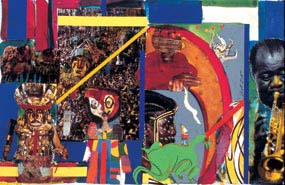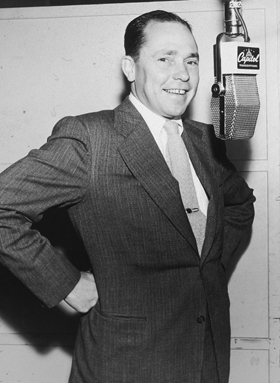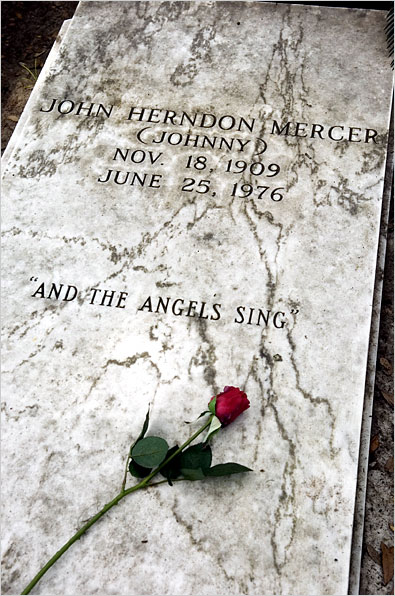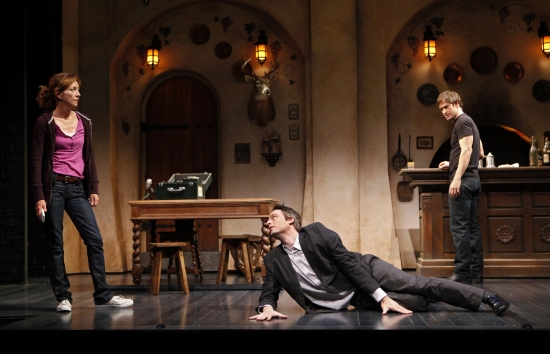Houghton Mifflin Harcourt is sending me on a coast-to-coast tour in support of Pops: A Life of Louis Armstrong. Here are the readings that I’ll be giving in December:
• BOSTON, DECEMBER 3: Boston Athenaeum, 10½ Beacon St., 6:00 p.m.
• NEW YORK, DECEMBER 7: Barnes & Noble Lincoln Triangle, 1972 Broadway, 7:30 p.m.
• LOS ANGELES, DECEMBER 8: Los Angeles Public Library, 630 W. Fifth St., 7:00 p.m.
• BALTIMORE, DECEMBER 9: Enoch Pratt Free Library, 400 Cathedral St., 6:30 p.m.
• PHILADELPHIA, DECEMBER 10: Philadelphia Free Library, 1901 Vine St., 7:30 p.m.
• CHICAGO, DECEMBER 15: Highland Park Library, 494 Laurel St., 6:00 p.m.
• ST. LOUIS, DECEMBER 16: Left Bank Books, 399 N. Euclid Ave., 7:00 p.m.
• NEW ORLEANS, DECEMBER 17: Garden District Bookshop, 2727 Prytania St., 5:30 p.m.
I’ll also be doing quite a bit of radio along the way. Watch this space for details.
Archives for November 2009
TT: Like they used to
Last week I posted a photograph of the Signet paperback edition of Louis Armstrong’s Satchmo: My Life in New Orleans. It was published in the good old days when most mass-market paperback covers were designed in such a way as to suggest that the contents were thoroughly lurid.
In honor of the upcoming publication of Pops: A Life of Louis Armstrong, one of my computer-savvy readers decided to do a bit of tinkering with the cover of the Signet edition of Satchmo. I was so delighted by the results that I decided to post them here as well.
I wish I could claim that Pops is that juicy! At least I can assure you that some of Armstrong’s letters are very definitely for adults only….
TT: Almanac
“Politics, as a practice, whatever its professions, has always been the systematic organization of hatreds.”
Henry Adams, The Education of Henry Adams
TT: It was twenty years ago today
 One Saturday morning twenty years ago I got a call from Michael Pakenham, my boss at the New York Daily News, for which I was then writing foreign-policy editorials. “It looks like the Berlin Wall may be coming down,” Michael said. “A million people are protesting in East Berlin. Get to the office as fast as you can. We’ve got to rip up the editorial page and get something into tomorrow’s paper.” I’d planned to spend the day taking it easy. Instead I watched history being made. Back then I was a suburbanite, so I jumped in my car, drove straight to Manhattan, and went to work. I can’t remember exactly what Michael and I wrote that morning, but I do know that we wrote it in a frenzy of delight.
One Saturday morning twenty years ago I got a call from Michael Pakenham, my boss at the New York Daily News, for which I was then writing foreign-policy editorials. “It looks like the Berlin Wall may be coming down,” Michael said. “A million people are protesting in East Berlin. Get to the office as fast as you can. We’ve got to rip up the editorial page and get something into tomorrow’s paper.” I’d planned to spend the day taking it easy. Instead I watched history being made. Back then I was a suburbanite, so I jumped in my car, drove straight to Manhattan, and went to work. I can’t remember exactly what Michael and I wrote that morning, but I do know that we wrote it in a frenzy of delight.
Five days later, on November 9, the wall was opened. I never thought I’d live to see that great day come to pass. I’ll never forget it as long as I live.
* * *
Arts & Letters Daily has posted a superb compilation of wall-related links.
TT: Consider the source
 Pops: A Life of Louis Armstrong has been picked for the December Indie Next Great Reads List, a monthly list of twenty new books recommended by the American Booksellers Association to its member stores. Here’s a sneak peek at the Indie Next capsule review of Pops, which was written by James Wilson of Octavia Books in New Orleans:
Pops: A Life of Louis Armstrong has been picked for the December Indie Next Great Reads List, a monthly list of twenty new books recommended by the American Booksellers Association to its member stores. Here’s a sneak peek at the Indie Next capsule review of Pops, which was written by James Wilson of Octavia Books in New Orleans:
Terry Teachout has written an amazing biography of New Orleans’ native son Louis Armstrong. Drawing on newly available primary sources, he weaves together a biography that is both illuminating and inspirational. Armstrong’s contributions to jazz, pop culture, and breaking the color barrier are well told in a crisp, clean prose. Highly recommended!
High and gratifying praise indeed, coming as it does from the birthplace of jazz.
Go here to see the rest of the December list.
TT: A kind of poet
 Mrs. T and I recently got around to watching Turner Classic Movies’ Johnny Mercer: The Dream’s on Me, a Clint Eastwood-produced two-hour documentary full of priceless archival footage. It’s being telecast in honor of the upcoming centennial of the birth of the author of the lyrics (and, on occasion, the music) to such classic songs as “Ac-cent-tchu-ate the Positive,” “Autumn Leaves,” “Blues in the Night,” “Come Rain or Come Shine,” “Days of Wine and Roses,” “Early Autumn,” “Emily,” “Jeepers Creepers,” “I Remember You,” “I Thought About You,” “I Wonder What Became of Me,” “I’m an Old Cowhand,” “I’m Old Fashioned,” “Laura,” “Moon River,” “One for My Baby,” “Something’s Gotta Give,” “Skylark,” and “That Old Black Magic.”
Mrs. T and I recently got around to watching Turner Classic Movies’ Johnny Mercer: The Dream’s on Me, a Clint Eastwood-produced two-hour documentary full of priceless archival footage. It’s being telecast in honor of the upcoming centennial of the birth of the author of the lyrics (and, on occasion, the music) to such classic songs as “Ac-cent-tchu-ate the Positive,” “Autumn Leaves,” “Blues in the Night,” “Come Rain or Come Shine,” “Days of Wine and Roses,” “Early Autumn,” “Emily,” “Jeepers Creepers,” “I Remember You,” “I Thought About You,” “I Wonder What Became of Me,” “I’m an Old Cowhand,” “I’m Old Fashioned,” “Laura,” “Moon River,” “One for My Baby,” “Something’s Gotta Give,” “Skylark,” and “That Old Black Magic.”
Though Mercer is my favorite lyricist, I didn’t write anything about The Dream’s on Me because I’d already said what I had to say about him in “Too Marvelous for Words,” an essay that I published in Commentary in 1994. Here is part of that piece, which has never been collected or reprinted since its original appearance.
* * *
Mercer’s brand of lyricism–unabashed yet unsentimental, and expressed with a colloquial directness that conceals extreme technical sophistication–is unmistakable. No one else, for example, could have written a lyric like “Skylark” (1942): Skylark,/Have you anything to say to me?/Won’t you tell me where my love can be?/Is there a meadow in the mist/Where someone’s waiting to be kissed? In its precise rhymes and beautifully shaped cadences, it is obviously a product of the golden age of American songwriting. But no other golden-age lyricist, not even Oscar Hammerstein II, could have aspired to its air of uncontrived simplicity….
 Mercer was one of the few major American songwriters who were not big-city Easterners–he came from Savannah, Georgia–and to some extent his style reflects this difference of cultural background. At the same time, though, he was more than a homespun versifier who just happened to write popular songs. His creative impulse, unlike that of Ira Gershwin or Cole Porter, was essentially lyrical, and this quality intensified as he grew older–so much so that in such later songs as “Days of Wine and Roses” (1962), the melody, memorable though it may be, is not needed in order to heighten the poetic quality of the words: The days of wine and roses/Laugh and run away,/Like a child at play,/Through the meadowland toward a closing door,/A door marked “Nevermore,”/That wasn’t there before….
Mercer was one of the few major American songwriters who were not big-city Easterners–he came from Savannah, Georgia–and to some extent his style reflects this difference of cultural background. At the same time, though, he was more than a homespun versifier who just happened to write popular songs. His creative impulse, unlike that of Ira Gershwin or Cole Porter, was essentially lyrical, and this quality intensified as he grew older–so much so that in such later songs as “Days of Wine and Roses” (1962), the melody, memorable though it may be, is not needed in order to heighten the poetic quality of the words: The days of wine and roses/Laugh and run away,/Like a child at play,/Through the meadowland toward a closing door,/A door marked “Nevermore,”/That wasn’t there before….
Gene Lees paradoxically asserts that Mercer “was more than a poet, he was a lyricist.” Like all paradoxes, this one sheds light without offering a definitive answer to the question it implies. My own published view, if less suggestive, has the virtue of being more clear-cut:
For all the utilitarian considerations that brought [his songs] into being, their aesthetic appeal is considerable, and the more I reflect on Mercer’s achievement, the more I am inclined to think that he deserves to be considered not merely as a writer of supremely well-crafted song lyrics, but as one of the most gifted poets this country has produced.
Continued immersion in and reflection on Mercer’s work has done nothing to change my opinion–though I would hasten to add that even his most frankly poetic lyrics are best heard in tandem with the melodies that inspired them. Hence they occupy the same equivocal position as, say, Bernard Herrmann’s film scores, which are the products of a collaborative process and cannot be properly evaluated outside the context of that process. It is revealing that Mercer published no poetry, presumably because he felt he had no gift for writing it. Only in the crucible of collaboration did his talents manifest themselves completely.
Does this diminish the significance of his achievement? Must he necessarily be considered a lesser artist than a writer who works exclusively on his own? To make such a claim, after all, is by extension to relegate all forms of collaborative art to a lower level of excellence simply because of the process by which they came into being. Is Citizen Kane an inferior work because Orson Welles created it in collaboration with Herrmann, the screenwriter Herman J. Mankiewicz, and the cinematographer Gregg Toland? Conversely, is Irving Berlin’s “How Deep Is the Ocean?” a better song than “Days of Wine and Roses” simply by virtue of the fact that Berlin wrote both words and music?
For me, the answer to all these questions is an unequivocal no–but whether or not that makes Johnny Mercer a true poet is another matter, and one about which he himself had nothing to say. Perhaps, though, one might look to one of his own lyrics, “One for My Baby,” for an answer:
You’d never know it,
But buddy, I’m a kind of poet,
And I’ve gotta lotta things to say.
And when I’m gloomy,
You simply gotta listen to me,
Until it’s talked away.
Who can doubt that the man who wrote these lines was at the very least “a kind of poet”? Or that the world will continue to listen to the things he had to say long after most of the full-fledged “poets” of our own day are dead and forgotten?
* * *
The Complete Lyrics of Johnny Mercer, a handsome coffee-table book that reprints all of Mercer’s lyrics, has just been published by Knopf.
Mosaic Select: Johnny Mercer, a three-CD box set, contains seventy-nine of the recordings that Mercer made as a singer between 1942 and 1947 for Capitol Records, the label that he co-founded.
Mercer also makes a cameo appearance on the version of “Lazy River” recorded by Bing Crosby and Louis Armstrong in 1960 for their only duet album, Bing & Satchmo. (You can download “Lazy River” individually from Amazon or iTunes.)
My favorite album of Mercer’s songs is Nancy LaMott’s Come Rain or Come Shine: The Songs of Johnny Mercer.
TT: Almanac
“Why does the writing make us chase the writer? Why can’t we leave well enough alone? Why aren’t the books enough?”
Julian Barnes, Flaubert’s Parrot
TT: All the way home
I review two off-Broadway shows, The Understudy and Nightingale, in today’s Wall Street Journal drama column. The first is great fun, the second so-so. Here’s an excerpt.
* * *
 I’ve been having trouble figuring out Theresa Rebeck–and I’ve had a lot of opportunities to try. She writes a new script (or two) every year, and most of her plays make it to New York sooner or later, which means that somebody out there must like them. Yet time and again Ms. Rebeck has served up the same disappointing dish, a smart, glib confection that starts off fresh, then goes flat at the halfway mark. So it’s both a delight and a relief to report that “The Understudy” is a raucously funny farce that makes it all the way to the finish line, though the two halves of the play, each of which is effective in its own right, don’t fit together, at least not neatly.
I’ve been having trouble figuring out Theresa Rebeck–and I’ve had a lot of opportunities to try. She writes a new script (or two) every year, and most of her plays make it to New York sooner or later, which means that somebody out there must like them. Yet time and again Ms. Rebeck has served up the same disappointing dish, a smart, glib confection that starts off fresh, then goes flat at the halfway mark. So it’s both a delight and a relief to report that “The Understudy” is a raucously funny farce that makes it all the way to the finish line, though the two halves of the play, each of which is effective in its own right, don’t fit together, at least not neatly.
As the title suggests, Ms. Rebeck’s new play is a backstage comedy about a frustrated actor with highbrow tendencies (Justin Kirk) whose inability to get work leaves him with no choice but to take a job as understudy to Jake (Mark-Paul Gosselaar), a second-tier action-movie hero who is diversifying his resumé by appearing on Broadway in a previously unpublished play by Franz Kafka. (The “Kafka” play is actually by Ms. Rebeck, and it’s a hoot.) This being a farce, there’s a king-sized catch: Roxanne (Julie White), the stage manager, is also the ex-fianceé of Harry, the understudy, who left her at the altar six years before without warning, explanation or good reason….
Farce is the trickiest of theatrical genres, but the first half of “The Understudy” is a little masterpiece of comic clockwork in which the craziness mounts steadily from scene to scene….
Lynn Redgrave needs no endorsements from critics, least of all me. She is one of the greatest actors of her generation, and it is always a blessing to see her on stage, whatever the circumstances. They aren’t exactly propitious in “Nightingale,” her new one-woman play, a part-true, part-imagined portrait of her maternal grandmother into which Ms. Redgrave has also woven a strand of personal reminiscence….
* * *
Read the whole thing here.
